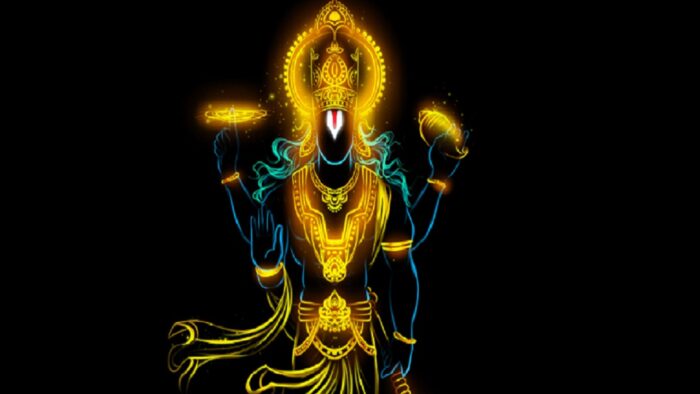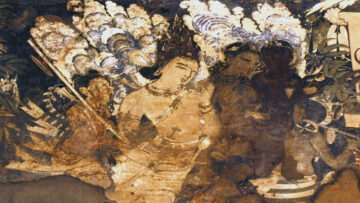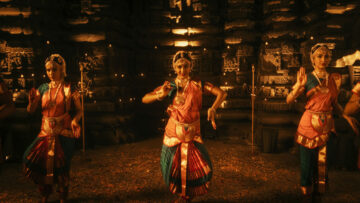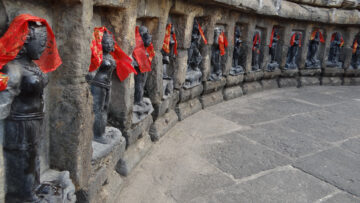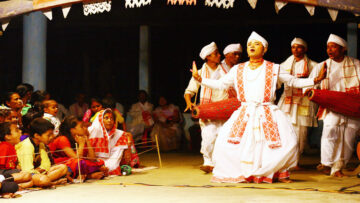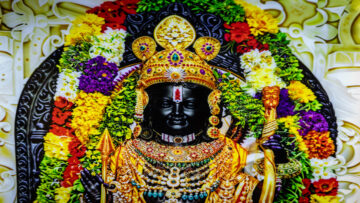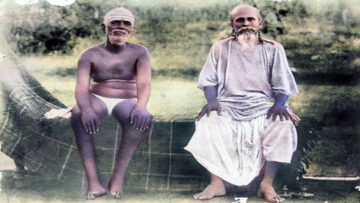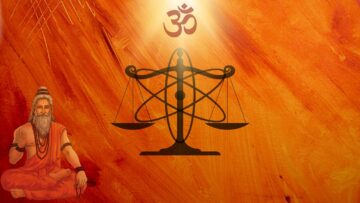Introduction
The term “Trivandrum Plays” refers to thirteen plays published in critical editions between 1912 to 1915 by T Gaṇapati Śāstrī through the Trivandrum Sanskrit Series. All these plays were ascribed to the prolific playwright whose plays like the Svapnavāsavadatta, acclaimed in works of literary criticism from antiquity, had been long presumed lost: Bhāsa. Referring to the Trivandrum Plays as “the Bhāsa plays” has since been standard in the academic discourse on them, despite the longstanding scholarly debate on “the Bhāsa problem” of the plays’ original authorship and subsequent alterations. In this study, use of the term “the Bhāsa plays” is as a designator of the Trivandrum Plays, agnostic of the plays’ actual provenance.
Benedictory opening verses or maṅgalācaraṇa verses appear with twelve of the Bhāsa plays (i.e., all except the Daridracārudatta where an opening benediction is missing), and eleven of these have Viṣṇu directly or via avatāra-s as their subject (i.e., all except the Pratijñāyaugandharāyaṇa which has Skanda as the subject of the benediction). These eleven verses, with themes deriving from the Rāmāyaṇa, Mahābhārata and Paurāṇika lore, are potentially interesting to study in their own right from a perspective of Vaiṣṇava devotion on a cultural platform, regardless of their link to the historical Bhāsa. In this study, these are referred to as “Vaiṣṇava benedictions” by applying the generic meaning of “Vaiṣṇava” as “related to Viṣṇu”, rather than in a specific sense to particular sampradāya-s.
Dedicated commentaries covering the opening benedictory verses, like those of Mallinātha Sūri’s for the works of Kālidāsa from the pre-modern era, are not available for the Bhāsa plays. Scholarship on the Bhāsa plays since their print publication has devoted varying degrees of attention to the benedictory verses. Arthur Berriedale Keith, in a chapter dedicated to Bhāsa in the 1924 book ‘The Sanskrit Drama’, takes notice of the benedictory verses neither during his survey of arguments on the authenticity and date of the Bhāsa plays, nor in his exposition of the plays’ sources, technique, style, language and meters. The translators A C Woolner and Lakshman Sarup of a 1929 translation of the Bhāsa plays included a separate prefatory note specifically for the caveat that the benedictory verses appearing with the scripts were likely to be later compositions found suitable for stage production. Distinct approaches can be seen in two roughly contemporary works in Hindi, namely, a 1964 book-length study on Bhāsa by Baladeva Upadhyaya which skips discussion on the benedictory verses altogether as though they are coincidental to the plays, and a 1967 doctoral thesis by Jagdish Dutt Dixit which acknowledges the overall Vaiṣṇava orientation of the verses and incorporates into the study a historical review of Vaiṣṇava thought with special emphasis on the Pāñcarātra tradition. While both the aforementioned scholars operate from the premise of pre-Kālidāsa antiquity of the contents of the Bhāsa plays, N P Unni in a 1978 book studies the scripts of the Trivandrum Plays in the context of Kūḍiyāṭṭam ecosystem of Kerala and thus entertains the possibility of some script elements including the benedictory verses being products of times later than those of the historical Bhāsa.
This study on Vaiṣṇava devotion in the benedictions accompanying the Bhāsa plays is organized on two levels:
- Internal review: At this level of review, Vaiṣṇava themes in the benedictory verses are studied within the context of the Bhāsa plays and of their source-material traceable to the Itihāsa-Purāṇa corpus.
- External review: At this level of review, thematic and stylistic influences discernible in the benedictory verses are studied in a historical context not limited to the period of the historical Bhāsa.
Methods
For handy reference, the eleven Vaiṣṇava benedictions from the Bhāsa plays are provided in Appendix 01 in the Devanāgarī script sourced from the critical editions of the Bhāsa plays by CR Devadhar (1937), along with their English translations from the volumes containing all the Bhāsa plays in English translation by Woolner and Sarup (1929). The order in which these benedictions are listed in Appendix 01 as well as the initial presentation in the Internal Review section, approximately follows the order in which the events in the corresponding plays are held by traditional lore to have occurred. The ordering, which itself organizes the listing along Vaiṣṇava themes, consists in turn of plays based on the Rāmāyaṇa (Pratimānāṭaka, Abhiṣekanāṭaka), Bhāgavata Purāṇa (Bālacarita), Mahābharata (Madhyamavyāyoga, Pañcarātra, Dūtavākya, Dūtaghaṭotkaca, Karṇabhāra, Ūrubhaṅga) and quasi-historical accounts and legends (Svapnavāsavadatta, Avimāraka).
Studies of the Bhāsa plays consulted include chapter-length ones by A B Keith in The Sanskrit Drama (1924) and S Dasgupta and SK De in ‘A History of Sanskrit Literature’ (1947), and book-length ones by Baladeva Upadhyaya (1964), Jagdish Dutt Dixit (1967), N P Unni (1978) and V Venkatachalam (1986).
The reading of the Bhāsa plays with an emphasis on the benedictory verses for this study was assisted by viewings of lectures in English on selected Mahābhārata-based plays from the Open Learning for All lecture series of Sanskrit Sahitya via the Chinmaya International Foundation YouTube channel, and of lecture series on the Svapnavāsavadatta and Bhāsa-nāṭaka-cakra in Kannada by Śatāvadhānī Dr R Ganesh via the Gokhale Institute of Public Affairs Live Events YouTube channel.
Verses from outside the Bhāsa plays, from other Sanskrit plays or devotional compositions which are referred here, are provided in the Devanāgarī script in Appendix 02.
Review Summary
The eleven Vaiṣṇava benedictions accompanying the Bhāsa plays are here studied from two standpoints:
- Internally within the context of the Bhāsa plays and the Vaiṣṇava content in the benedictory plays traceable to Itihāsa-Purāṇa sources.
- Externally placing the benedictory verses in an extended historical context of Sanskrit theatre and Vaiṣṇava devotional poetry
Internal Review
Initially, each of the eleven benedictions will be reviewed individually with a focus on their appositeness to the corresponding plays and their Vaiṣṇava content. Patterns of coverage of Vaiṣṇava themes, particularly avatāra-s, in these verses considered as a group will then be examined. The text of the eleven opening benedictions and along with other relevant verses from the Bhāsa plays is provided in the Devanāgarī script from the critical edition by CR Devadhar (1937) in Appendix 01, with English translations for the opening benedictions from Woolner and Sarup (1929).
Individual benedictions in the context of their plays
Pratimānāṭaka: The opening benediction for this Rāmāyaṇa-based play fittingly seeks for the audience the protection of Rāma, who is described in a string of epithets hailing his excellences in form, character and action. The literary device of mudrālaṅkāra can be seen employed, whereby the epithets in praise of Rāma contain the sounds forming the names of characters in the play (Sītā, Sumantra, Sugrīva, Lakṣmaṇa, Rāvaṇa, Vibhīṣaṇa and Bharata) as well as the name of the play itself (Pratimā). The assortment of excellences attributed to Rāma is similar to the listing of virtues occurring in the Nārada-Vālmīki saṃvāda at the beginning of the Vālmīki Rāmāyaṇa, in that both speak simultaneously of excellences both in appearance and conduct, and both speak of these excellences realized in a man on earth. The Pratimānāṭaka itself on the whole “presents Rāma as an ordinary human being throughout and scrupulously eschews episodes projecting his superhuman powers” in the reading of V Venkatachalam. The concluding benediction of this play also casts Rāma as an exemplary earthly king, whom it is hoped the ruler of the audience’s realm will emulate.
Abhiṣekanāṭaka: The opening benediction of this other Rāmāyaṇa-based play also seeks the protection of Rāma, in a striking antithetical-seeming manner by casting it as protection sought from one who is repeatedly described as a slayer and destroyer (of the Rākṣasa-s hindering Viśvāmitra’s yajña, Virādha, Khara, Dūṣaṇa, Kabandha, Vālī, and the clan of Rāvaṇa). Since the play begins in medias res in the Kiṣkindhākāṇḍa, the benedictory verse serves the purpose of recapitulating events of importance from earlier kāṇḍa-s, with repeated emphasis on the heroic aspect and martial prowess of Rāma. V Venkatachalam observes that “Rāma is portrayed as the incarnation of the supreme God Viṣṇu and is invested with all divine powers” in the Abhiṣekanāṭaka. A pair of verses where Varuṇa proclaims Rāma to be Nārāyaṇa himself in human form, appears in Act 4 Verses 13-14.
Bālacarita: The benediction for the Bālacarita, a play teeming with miraculous feats of the young Kṛṣṇa, evocatively casts he whose protection is sought as appearing in distinct hues in different yuga-s as Nārāyaṇa, Viṣṇu, Rāma and Dāmodara, paralleling the description in the Nārada-Vasudeva Saṃvāda in Śrīmad Bhāgavatam 11.05.20-36. The protagonist of the play, Kṛṣṇa, is evoked in the benediction alongside what are understood as his own earlier manifestations, by the name Dāmodara which evokes the scene of Yaśodā tying him to a mortar from Act 3 of the play. It is by the name Dāmodara that Kṛṣṇa is referred to throughout Acts 3 to 5 of the play consisting of his exploits. A verse of generic veneration to Nārāyaṇa who is also Rāma occurs early in the Bālacarita in Act 1 Verse 08, and is representative of the simplicity of language that struck critics with regard to the entire play, leading to speculation like that by V Venkatachalam that the play was intended for a cast and audience of primarily children.
Madhyamavyāyoga: The benediction for the Madhyamavyāyoga seeks the protection of the foot of Hari, with an image of the stride of Vāmana risen as Trivikrama. While this play is within a Mahābhārata canvas, the plot is of the playwright’s imagination centred on Bhīma and Ghaṭotkaca without featuring Kṛṣṇa. As such, there is no thematic relation of the benediction with the plot, though it is notable that this play’s closing benediction also evokes Vāmana by the name Upendra.
Pañcarātra: The benediction of the Pañcarātra seeks the protection of Viṣṇu referred to not by any standard epithets, but obliquely through epithets that paronomastically list this Mahābhārata-based play’s characters (Droṇa, Bhīma, Arjuna, Karṇa, Śakuni, Duryodhana, Bhīṣma, Yudhiṣṭhira, Virāṭa, Uttara and Abhimanyu) that do not include Kṛṣṇa. The descriptor most clearly suggesting that it is Viṣṇu whose protection is sought, is of him having the foremost of birds as his mount. The theme of yajña is extensively emphasized, in the benediction evoking Virāṭ who is instrumental in the yajña described in the Ṛgveda’s Puruṣa Sūkta, in the play’s very name Pañcarātra evoking the five-night yajña described as having been performed by Nārāyaṇa in Śatapatha Brāhmaṇa 13.6.1, and in the play’s first act with profuse descriptions of the sacrifice conducted by Duryodhana which according to the Mahābhārata is theVaiṣṇava yajña.
Dūtavākya: While it is Kṛṣṇa who is the protagonist of the Dūtavākya, which has the distinction of having the highest percentage of verses among the Bhāsa plays, the opening benediction seeks the protection of the foot of Upendra. A parallel may be discerned between Upendra’s mission for the sake of the deva-s to parley with the king Mahābali, and Kṛṣṇa’s mission portrayed in this play as an envoy of the deva-born Pāṇḍava-s to the prince Duryodhana. Kṛṣṇa is referred to as Vāsudeva throughout the play script. A notable feature of this play from a Vaiṣṇava and specifically Pāñcarātra standpoint is the appearance as characters in the play of weapons of Viṣṇu (namely, Sudarśana, Śārṅga, Kaumodakī, Pāñcajanya and Nandaka) in anthropomorphic form as Āyudha-puruṣa-s.
Dūtaghaṭotkaca: The opening benediction of the Dūtaghaṭotkaca, a play with an original plot in the Mahābhārata canvas with Ghaṭotkaca and Duryodhana as the chief protagonist and antagonist, seeks the protection of Nārāyaṇa described as the prime mover of the world likened to a drama. While the benediction is not thematically specific to the play, the verse sounds apt at successively larger contexts of the playwright’s entire body of theatrical work, of the art of theatre itself through the ages, and of the cosmic functions traditionally ascribed to a triad of deities here ascribed to one Supreme Being.
Karṇabhāra: The benediction of the Karṇabhāra, the shortest of the Bhāsa plays set just prior to Karṇa’s final battle, seeks the blessing of prosperity from Śrīdhara who had manifested as the fierce Narasiṃha. The verse has no apparent thematic link to the plot of this Mahābhārata-based play.
Ūrubhaṅga: The opening benediction of the Ūrubhaṅga, a Mahābhārata-based play set in the final battle between Bhīma and Duryodhana, prays for Kṛṣṇa to be our ferryman amid our foes, the way he was to Arjuna across the metaphorical river that was the Kurukṣetra war brought into being by Arjuna’s foes (Bhīṣma, Droṇa, Jayadratha, Śakuni, Karṇa, Aśvatthāmā, Kṛpa and Duryodhana) in their own ways. The benediction is thematically apposite in that Kṛṣṇa’s counsel is indispensable to the Pāṇḍava-s prevailing over their foe in the events portrayed in the play. Balarāma has a conspicuous presence as a character in this play.
Svapnavāsavadatta: The opening benediction of the Svapnavāsavadatta seeks the protection of the arms of Balarāma while alluding to his fondness for wine, with no thematic relation to the play except for the names of the characters Udayana, Vāsavadattā and Padmāvatī appearing paronomastically.
Avimāraka: The opening benediction of Avimāraka seeks Nārāyaṇa’s emperorship over the Earth, which was associated with multiple avatāra-s when retrieved by Varāha, straddled by Vāmana, shaken during battles by Narasiṃha (and Varāha), and ruled by Rāma.
Benedictions from the Bhāsa plays in their mutual context
Of the eleven opening benedictions under study, all are cast as prayers that a deity may protect (indicated by the use of verb forms pātu, pāyāt and pātām on grammatical and metrical considerations) the audience, except of the following three plays where the declared intent of the prayer varies.
- Karṇabhāra, where prosperity is sought from the deity aptly addressed as Śrīdhara,
- Ūrubhaṅga, where Keśava is sought as a ferryman leading us beyond peril,
- Avimāraka, where it is asked that Nārāyaṇa govern the entire Earth as his empire,
Among the eleven opening benedictions under study, it is those of both the Rāmāyaṇa plays that are mostly clearly centred on the corresponding plays’ protagonist: Rāma. The verses at the opening of the Pratimānāṭaka and Abhiṣekanāṭaka can be seen emphasizing different facets of the personality of Rāma, leading Jagdish Dutt Dixit to observe that these verses in turn evoke the kingly Rāma’s gentle gracious aspect and the warrior Rāma’s heroic aspect. References to Rāma occur juxtaposed with those of other avatāra-s in the benedictions of the Bālacarita (Vāmana and Kṛṣṇa) and Avimāraka (Varāha, possibly Narasiṃha, and Vāmana).
The avatāra-puruṣa sharing comparable prominence in worship with Rāma is Kṛṣṇa, and it is the Bhāsa plays set in the Mahābhārata era that would naturally be expected to have the most scope for centre-staging Kṛṣṇa in the benediction. The Ūrubhaṅga has the only benediction in the set that explicitly and exclusively refers to the role of Kṛṣṇa in the Mahābhārata as a guide and benefactor of Arjuna. Even the Bālacarita which has Kṛṣṇa for its protagonist has a benediction not centred exclusively on Kṛṣṇa the incarnation but more expansively on the deity who is the source of the named incarnations. Balarāma, an avatāra contemporaneous to Kṛṣṇa, appears in the benediction of the Svapnavāsavadatta, without shared context with the play that is set outside the Mahābhārata era. Besides the Bālacarita, two other Mahābhārata-era plays having benedictions referring to the deity in forms more primal than the earthly incarnations are Dūtaghaṭotkaca and Pañcarātra.
Nārāyaṇa, as one whose presence precedes and renders the earthly incarnations, is hailed in the Bālacarita benediction as a manifestation of the divine in the Kṛtayuga, in the Dūtaghaṭotkaca benediction as the sūtradhāra in all ages of the drama that is the universe, in the Avimāraka benediction as the emperor whose reign over the Earth is cherished, and in the Pañcarātra benediction as one who is intent on yajña. The Pañcarātra, both in the benediction and the first act, is notable in evoking Śruti-based themes of the primal Yajña in which Nārāyaṇa was instrumental, besides Itihāsa-Purāṇa themes. The choice of the name ‘Pañcarātra’ for this play, along with the preponderance of Vaiṣṇava imagery in the opening benedictions, is held by Jagdish Dutt Dixit as grounds for believing that the author of the Bhāsa plays is of Pāñcarātra Vaiṣṇava persuasion. The occurrence of notable references in the Bhāsa plays to Balarāma who as Saṅkarṣaṇa is a central figure in the Pāñcarātra system, along with the apparent naming of a play after this tradition, is taken by V Venkatachalam as suggesting that the “personal religion” of the author is the PāñcarātraVaiṣṇava-sampradāya.
Of the avatāra-s before the Rāmāyaṇa and Mahābhārata eras, Narasiṃha appears in a possible allusion in the Avimāraka benediction and prominently in the Karṇabhāra benediction. While the Karṇabhāra benediction exclusively features Narasiṃha without apparent thematic relation to the play, its occurrence may be significant if we assume that Narasiṃha is emblematic of the ruler referred to as Rājasiṃha in the closing benediction or bharatavākya of several of the Bhāsa plays under study here (Abhiṣekanāṭaka, Bālacarita, Pañcarātra, Dūtavākya, Svapnavāsavadatta and Avimāraka). The Vāmana avatāra appears comparable to the Rāmaavatāra in prevalence and prominence in this set of benedictions, with two instances of exclusive appearance (Madhyamavyāyoga and Dūtavākya) and two instances in juxtaposition (Bālacarita and Avimāraka).
External Review
The scholarly debate on “the Bhāsa problem” has featured participants highlighting the possibilities of the Trivandrum Plays being products of a time more recent than the historical Bhāsa in the artistic milieu of the Kūḍiyāṭṭam practised traditionally by the Cākyār-s of Kerala where the plays were rediscovered. An exercise of compiling opening benedictions from other Rāmāyaṇa-based and Mahābhārata-based Sanskrit plays is undertaken here, with an emphasis on plays with a known history of Kūḍiyāṭṭam performance. This compilation is intended to serve as a ready resource for future scholarly efforts to study the stylistic similarities with those of the Bhāsa plays, with a view towards implications on the Bhāsa problem. An assortment of verses from wider Sanskrit devotional literature sharing similarities in form and spirit the benedictions in the Bhāsa plays is also compiled in a similar spirit. Both sets of verses are provided in the Devanāgarī script in Appendix 02.
Survey of benedictions in Sanskrit plays based on the Rāmāyaṇa and Mahābhārata
The Itihāsa-s Sanskrit plays of varied provenance whose benedictions are superficially examined here, are from these lists appearing in the 1967 doctoral thesis of Jagdish Dutt Dixit:
i) Rāmāyaṇa-based plays: Mahāvīracarita and Uttararāmacarita of Bhavabhūti, Anargharāghava of Murāri, Kundamālā of Diṅnāga, Bālarāmāyaṇa of Rājaśekhara, Āścaryacūḍāmaṇi of Śaktibhadra
ii) Mahābhārata-based plays: Veṇīsaṃhāra of Bhaṭṭanārāyaṇa, Pracaṇḍapāṇḍava or Bālabhārata of Rājaśekhara, Subhadrādhanañjaya and Tapatīsaṃvaraṇa of Kulaśekhara
Of the above, the Āścaryacūḍāmaṇi, Subhadrādhanañjaya and Tapatīsaṃvaraṇa are of particular interest considering their historical presence in the Kūḍiyāṭṭam repertoire in Kerala. The Āścaryacūḍāmaṇi being traditionally performed in a trilogy with the Pratimānāṭaka and Abhiṣekanāṭaka, is mentioned by N P Unni in his book chapter “Bhasa plays on the Kerala Stage” in the book “New Problems in Bhasa Plays”, where he also describes some practices routine in Kūḍiyāṭṭamsuch as staging plays in part (selected acts) rather than fully, and customizing the ceremonial openings of such performances with verses from a wider repertoire than benedictions occurring in critical editions of plays.
Of the Rāmāyaṇa-based plays listed here, it is only the Āścaryacūḍāmaṇi that opens with a benediction seeking the protection of Viṣṇu (here visualized in his reclining form), marked for recitation by the sūtradhāra in the manner that has been noted as a characteristic of the Bhāsa plays. Even the deity featured in the benedictions of the other plays is not Viṣṇu, except for the Anargharāghava which, though addressed to Viṣṇu, has a declaration of reverence (with the verb “upāsmahe”) towards the eyes of Viṣṇu rather than a seeking of protection per se in its benediction.
Of the Mahābhārata-based plays listed here, Viṣṇu is featured in the opening benedictions of all except the Bālabhārata of Rājaśekhara, namely, the Veṇīsaṃhāra, Subhadrādhanañjaya and Tapatīsaṃvaraṇa. The Veṇīsaṃhāra benediction too is cast not as a seeking of protection or blessing, but as a gesture of worship (añjali) to the feet of Hari, like the Anargharāghava benediction is to the eyes of Viṣṇu. The Subhadrādhanañjaya and Tapatīsaṃvaraṇa, both authored by Kulaśekhara in Kerala, both open with benedictions emphasizing the aspect of Viṣṇu as the consort of Lakṣmī with a quality of śṛṇgāra not seen in any of the benedictions with the Bhāsa plays.
The plays other than those opening with benedictions featuring Viṣṇu include those whose benedictions include veneration of an impersonal rather than a personal god (Mahāvīracarita), of Speech and Language (Uttararāmacarita, Bālarāmāyaṇa, Bālabhārata), and of Śiva (Kundamālā, Bālabhārata).
Though not a play based on the epics, the Bhagavadajjuka of the prahasana genre with a history of performance in Kūḍiyāṭṭam opens with a benediction seeking the protection of Rāma. The published script of the Yajñaphala, a Rāmayaṇa-based play once purported to be Bhāsa’s and later discredited, opens with a benediction seeking the protection of Rāma along with all his brothers.
Benedictions with the Bhāsa plays in a broader Bhakti context
The benedictory verse for the Svapnavāsavadatta seeking the protection of Balarāma’s arms, and that of the Dūtavākya seeking the protection of Vāmana’s upraised foot, can be recognized as instances of a genre that hails a feature or a gesture of a deity as sources of protection and blessing, exemplified in Jayadeva’s Gītagovinda (e.g., Verse 01.06) and Līlāśuka’s Kṛṣṇakarṇāmṛta (e.g., Verse 2.002). The benedictory verse for the Ūrubhaṅga likening the Kurukṣetra war to a raging river closely resembles the verse usually appearing as the sixth in the traditional Gītā Dhyāna recitation.
Discussion
On purely literary considerations, the benedictions with the Bhāsa plays have overall not earned critical acclaim. “Tasteless paronomasia” is the term of Woolner and Sarup for the literary device seen employed in the Pratimānāṭaka and Pañcarātra benedictions, and V Venkatachalam reckons ornamentation like the yamaka-alaṅkāra in the Dūtavākya benediction as the work of an “immature hand”. An aesthetic assessment of the benedictions with the Bhāsa plays has not been undertaken in this study, where the focus is on the verses’ Vaiṣṇava significance.
Of the thirteen Bhāsa plays, eleven have benedictions featuring Viṣṇu oravatāra-s. The opening benedictions of all three extant plays of Kālidāsa along with his epic poem Raghuvaṃśa, which all feature Śiva, have inspired much study of how Śiva is venerated in poetry. The association of Śiva with the performing arts, evident in epithets like Naṭarāja and Sabhāpati, seems to have rendered Śiva frequently as a deity of choice in on-stage benedictions. The addressing of Viṣṇu as Raṅganātha is simultaneously an etymological and symbolic Vaiṣṇava counterpart to the addressing of Śiva as Sabhāpati. In this study, the Dūtaghaṭotkaca benediction can be seen presenting a vision of Viṣṇu as verily Raṅga-nātha, the Lord and Guardian of the Stage that is the World.
While the eleven verses studied here are replete with references to avatāra-s of Viṣṇu, no explicit mention of a standard listing of ten avatāra-s (Daśavatāra) is to be found in the Bhāsa plays. A key point of variation between two prominent traditional Daśavatāra listings, is whether the avatāra-s are understood to include Kṛṣṇa (like the list assumed in musical compositions like Bhadrācala Rāmadāsa’s kṛti ‘Takkuvēmi manaku’, or Svāti Tirunāḷ’s ‘Kamalajāsya’ Rāgamālikā), or are understood to be of Kṛṣṇa and hence not including Kṛṣṇa (like in Jayadeva’s Gītagovinda). Which of these two views of Kṛṣṇa was in currency in the milieu of composition of the eleven verses under study, is difficult to conclude. In the Bālacarita benediction, there is an allusion to Kṛṣṇa alongside Rāma and Vāmana as though arranged in a series of incarnations. However, theBālacaritaas a play primarily on Kṛṣṇa can also be observed as having a benediction associating the protagonist intimately with Viṣṇu or Nārāyaṇa, in a way that the plays with Rāma as their protagonist do not.
The apparent prominence to some avatāra-s in the benedictions with the Bhāsa plays prompts speculation about influences endemic to southern India on the rediscovered form of the plays. Vāmana being featured exclusively in the benedictions of the Dūtakāvya and Madhyamavyāyoga which have no other relation to this avatāra, suggests a social milieu where this avatāra was celebrated in the popular imagination as well as in a literal festive sense, like in classical Tamiḻakam and Kerala. Similarly, Balarāma being featured in the Svapnavāsavadatta benediction may be viewed in the light of the importance of this avatāra in the traditional theatre of Kerala, where a Nāṭyaśāstra text was composed with the title ‘Balarāma Bharatam’. The lone mention of Narasiṃha in the Karṇabhāra benediction is reminiscent of the copious references to a ruler with the epithet Rājasiṃha in concluding benedictions of the Bhāsa plays, which have prompted speculation that the rediscovered plays were once staged in the patronage of the Pallava empire where that epithet was in currency. On the theme of worthy and righteous rulers, the maxim “nāviṣṇuḥ pṛthivīpati” (“None but Viṣṇu is [truly] a ruler [of the Earth]”) may be aptly recalled on hearing the Avimāraka benediction which also has the distinction of referring to the most avatāra-s.
This study did not seek to establish any position on the “Bhāsa problem”, in that it was the Vaiṣṇava significance of the benedictory verses that was the focus of study, regardless of their authorship. However, the intent is not to diminish the value of future investigations on the Bhāsa problem, for which N P Unni makes an earnest case at the end of “New Problems in Bhasa Plays”. Studies like the current one which was descriptive rather than investigative, with a thematic rather than stylistic focus, can potentially complement and assist future research on dating and attribution of Sanskrit theatrical texts like the Bhāsa plays.
Conclusion
The eleven benedictory verses of Vaiṣṇava veneration that have come down to us with the Bhāsa plays are a veritable trellis-window offering glimpses of the intertwining of epic lore with devotional traditions in the shared space of Sanskrit theatre.
References
Devadhar, C. (Ed.). (1936). Plays ascribed to Bhāsa: Original Thirteen Texts in Devanāgarī [Internet Archive]. Poona Oriental Book Agency. https://archive.org/details/in.ernet.dli.2015.281852/mode/2up
Woolner, A. C., & Sarup, L. (1985). Thirteen Plays of Bhasa: Pratijnayaugandharayana, Svapnavasavadatta, Carudatta, Pancaratra, Madhyamavyayoga, Pratima-nataka, Dutavakya, Dutaghatotkaca, Karnabhara, Urubhanga, Avimaraka, Balacarita, Abhiseka: Vol. 2 Vols. bound in one (First MLBD Reprint: Delhi, 1985) [Internet Archive]. Motilal Banarsidass. https://archive.org/details/ThirteenPlays2VolBoundInOne/mode/2up?view=theater
Dasgupta, S., & De, S. K. (1947). A History of Sanskrit Literature: Classical Period (Vol. 1) [Internet Archive]. https://archive.org/details/historyofsanskri033357mbp/mode/2up?view=theater
Keith, A. B. (1954). The Sanskrit Drama in Its Origin, Development, Theory & Practice (Reprinted Lithographically) [Internet Archive]. Motilal Banarsidass Publ. https://archive.org/details/in.ernet.dli.2015.185580/page/n1/mode/2up?view=theater
Unni, N. P. (1978). New Problems in Bhasa Plays. Trivandrum : College Book House.
Venkatachalam, V. (1986). Bhasa. Sahitya Akademi.
Upādhyāya, B. (1964). महाकविभास : एकअध्ययन [Mahākavi Bhāsa : A Study] [Internet Archive]. The Chowkhamba Vidya Bhavan, Varanasi. https://archive.org/details/in.ernet.dli.2015.308370/page/n1/mode/2up
Dixit, J. D. (1967). भासकीभाषा-सम्बन्धीतथानाटकीयविशेषताएँ [Linguistic and dramatic peculiarities of Bhāsa] [Internet Archive]. Arya Book Depot. https://archive.org/details/bhaskeebhasasamb014594mbp/mode/1up
Mahulikar, G., Patil, S., & Chinmaya Internation Foundation [Chinfo Channel]. (2022). OLA Lecture Series on Sanskrit Sahitya [Video]. YouTube. Retrieved March 31, 2023, from https://www.youtube.com/playlist?list=PLlNdduOe1pp3ORnlKtQTQ7joq9G-HmTtJ
Ganesh, R. & Gokhale Institute of Public Affairs [GIPA Live Events]. (2020b). Basanataka Chakra-Shatavadhani Dr.R.Ganesh [Video]. Youtube. Retrieved March 31, 2023, from https://www.youtube.com/playlist?list=PLoPhUooqLMHfQ-4XG6sMDbl80tl9m5YX3
Ganesh, R. & Gokhale Institute of Public Affairs [GIPA Live Events]. (2020). Basamahakaviya Swapnavasavadatta Mattu Mahakavi Bhavabhutiya Uttararamacharitam [Video]. YouTube. Retrieved March 31, 2023, from https://www.youtube.com/playlist?list=PLoPhUooqLMHejTasr52G5D8l91IO28p9J
IIT Kanpur (Ed.). (2015). Balakanda Sarga 1. Valmiki Ramayana Developed and Maintained by IIT Kanpur. Retrieved March 31, 2023, from https://www.valmiki.iitk.ac.in/sloka?field_kanda_tid=1&language=dv&field_sarga_value=1
The Bhaktivedanta Book Trust International, Inc (Ed.). (n.d.). Śrīmad-Bhāgavatam Canto 11 Chapter 5. Bhaktivedanta Vedabase. Retrieved March 31, 2023, from https://vedabase.io/en/library/sb/11/5/
Rig Veda: Rig-Veda, Book 10: HYMN XC. Puruṣa. (n.d.). Internet Sacred Text Archive. Retrieved March 31, 2023, from https://www.sacred-texts.com/hin/rigveda/rv10090.htm
Satapatha Brahmana Part V (SBE44): Thirteenth Kanda: XIII, 6, 1. Sixth Adhyâya. First Brâhmana. (n.d.). Internet Sacred Text Archive. Retrieved March 31, 2023, from https://sacred-texts.com/hin/sbr/sbe44/sbe44110.htm
Ācārya Śrī Rāmacandra Miśra. (1968). Mahāvīracarita of Mahākavi Śrī Bhavabhūti: Edited with the Prakāśa Sanskrit-Hindi Commentary [Internet Archive]. The Chowkhamba Vidyabhawan, Varanasi. https://archive.org/details/MahaviraCharitaOfMahakaviSriBhavabhuti/mode/2up?view=theater
The Uttara Rama Charita of Bhavabhuti: With Sanscrit Commentary by Pandit Bhatji Shastri Ghate of Nagpur (V. S. Patwardhan, Trans.). (1895). [Internet Archive]. The Nyaya Sudha Press, Nagpur. https://archive.org/details/uttararamachari00patvgoog/page/n2/mode/2up?view=theater
Paṇḍit Durgâprasâd, & Wâsudev Laxmaṇ Śâstrî Paṇśîkar (Eds.). (1929). The Anargharâghava of Murâri: With the commentary of Ruchipati [Internet Archive]. Nirnaya Sagar Press, Bombay. https://archive.org/details/in.ernet.dli.2015.507399/mode/2up?view=theater
M Ramakrishna Kavi. (1923). Kundamala (S K Ramanatha Shastri, Ed.) [Internet Archive]. M Ramakrishna Kavi. https://archive.org/details/kundamalaofdignagaramakrishnakavim.ramanathashastri_617_T/mode/2up?view=theater
Pandit Govinda Deva Śástri (Ed.). (1869). The Bálarámáyana: A Drama by Rájaśekhara [Internet Archive]. The Medical Hall Press. https://archive.org/details/in.ernet.dli.2015.362388/mode/2up?view=theater
Jhā, R. K. (1966). Āścharya Chūdāmaṇi of Mahākavi Śakti Bhadra : Edited with the “Ramā” and “Mālatī” Sanskrit and Hindi Commentaries [Internet Archive]. The Chowkhamba Vidyabhawan, Varanasi. https://archive.org/details/ascharya-chudamani-of-shakti-bhadra-pt.-ramakant-jha/mode/2up?view=theater
Jha, R. D., & Pandeya, A. N. (Eds.). (1962). Veṇīsaṃhāra Nāṭaka of Shri Bhatta Narayana: Edited with the Prabodhini and Prakasha Sanskrit and Hindi Commentaries (Eighth) [Internet Archive]. https://archive.org/details/in.ernet.dli.2015.403238/mode/2up?view=theater
Paṇdita Durgâprasâda, & Kâśînâtha Pâṇduranga Paraba (Eds.). (1887). The Karpûramanjarî (With the Commentary of Vâsudeva) and the Bâlabhârata of Râjaśekhara [Scribd]. The Nirnaya Sagara Press. https://www.scribd.com/doc/269885386/Karpuramanjari-Balabharatam-Of-Rajasekhara-1887
T Gaṇapati Sastri (Ed.). (1912). The Subhadrâdhananjaya of Kulasekhara Varma: With the Commentary of Sivarâma [Internet Archive]. Trivandrum Sanskrit Series. https://archive.org/details/Trivandrum_Sanskrit_Series_TSS/TSS-013_Subhadradhananjayam_-_TG_Sastri_1912/page/n3/mode/2up
T Ganapati Sâstrî (Ed.). (1911). The Tapatîsamvaraṇa of Kulasekhara Varma: With the Commentary of Sivarâma [Internet Archive]. https://archive.org/details/Trivandrum_Sanskrit_Series_TSS/TSS-011_Tapathisamvaranam_of_Kulasekharavarma_-_TG_Sastri_1911
Veturi Prabhakara Sastri (Ed.). (1986). Bodhayana’s Bhagavadajjukam (2nd ed.) [Internet Archive]. Manimanjari Publications. https://archive.org/details/BhagavadajjukamBodhayanaVPrabhakaraSastri1986/page/n1/mode/2up?view=theater
Jivaram Kalidas Shastri (Ed.). (1941). The Yajñaphala of Mahakavi Bhāsa: With a short introduction by Jivaram Kalidas Shastri (1st ed.). [Internet Archive]. The Rasashala Aushadhashram, Gondal, Kathiawar. https://archive.org/details/in.ernet.dli.2015.281136/mode/2up?view=theater
Rao, D. H. (2008). Gita Govindam 1 Sanskrit UTF. Sanskrit Documents. Retrieved March 31, 2023, from https://sanskritdocuments.org/sites/giirvaani/giirvaani/gg_utf/gg_1_utf/gg_1_sans_utf.htm
Menon, K. P. A. (1994). Līlāśuka Kṛṣṇakarṇāmṛtam (1st ed.) [Internet Archive]. Nag Publisher. https://archive.org/details/lilasukakrsnakarnamrtamkrishnakarnamritamengtranslbydrkpamenonnagpublisher1994/mode/2up?view=theater
Sri Bhagavadgita Dhyanam – श्रीगीताध्यानम् – Stotra Nidhi. (2022, December 2). Stotra Nidhi. Retrieved March 31, 2023, from https://stotranidhi.com/hi/sri-bhagavadgita-dhyanam-in-sanskrit/
Appendix 01: Benedictory verses and other relevant verses from the Bhāsa Plays
Benedictions with the Bhāsa plays
Pratimānāṭaka
सीताभवःपातुसुमन्त्रतुष्टः
सुग्रीवरामःसहलक्ष्मणश्च |
योरावणार्यप्रतिमश्चदेव्या
विभीषणात्माभरतोऽनुसर्गम् ||
(May the Fortune of the Furrow guard us, he that is pleased with lovely verses, charming with his beauteous neck, and every auspicious mark; the supporter whose soul inspireth awe, matchless foe of him that made the godless cry, may he protect us in every birth).
Abhiṣekanāṭaka
योगाधिपुत्रमखविघ्नकराभिहन्ता
युद्धेविराधखरदूषणवीर्यहन्ता |
दर्पोद्यतोल्बणकबन्धकपीन्द्रहन्ता
पायात्सवोनिशिचरेन्द्रकुलाभिहन्ता ||
(May Rāma protect you — he that slew the obstructors of Viśvāmitra’s sacrifice, vanquishing in battle the valour of Virādha,Khara and Dūṣaṇa, he that killed Kabandha and the Monkey King, swelling with overweening pride, and smote the house of the demon chief).
Bālacarita
शङ्खक्षीरवपुःपुराकृतयुगेनाम्नातुनारायण-
स्त्रेतायांत्रिपदार्पितत्रिभुवनोविष्णुःसुवर्णप्रभः |
दूर्वाश्यामनिभःसरावणवधेरामोयुगेद्वापरे
नित्यंयोऽञ्जनसन्निभःकलियुगेवःपातुदामोदरः ||
(Forever and ever may that God protect you — who with a body white as milk or conch of old was named Nārāyaṇa in the golden age; who shone like gold and measured the triple world, entitled Viṣṇu in the silver age; who dark as dūrvā grass slew Rāvaṇa, and was called Rāma in the copper age; who now is black like collyrium, Dāmodara in the age of iron).
Madhyamavyāyoga
पायात्सवोऽसुरवधूहृदयावसादः
पादोहरेःकुवलयामलखड्गनीलः |
यःप्रोद्यतस्त्रिभुवनैकमणेरराज
वैदूर्यसङ्कमइवाम्बरसागरस्य ||
(May Hari’s foot protect you—a torment for the hearts of demon’s dames—lotus-blue like a burnished blade. His foot, upraised to overstep the triple world, which gleams like a bridge of beryl in the ocean of the sky).
Pañcarātra
द्रोणःपृथिव्यर्जुनभीमदूतो
यःकर्णधारःशकुनीश्वरस्य |
दुर्योधनोभीष्मयुधिष्ठिरःस
पायाद्विराडुत्तरगोऽभिमन्युः ||
(May the Resplendent One protect you, that cloud harbinger upon the earth of the bright and terrible. Pilot of the lord of birds, he is hard to combat, grimly steadfast in battle, but takes the higher path intent on sacrifice).
Dūtavākya
पादःपायादुपेन्द्रस्य
सर्वलोकोत्सवःसवः |
व्याविद्धोनमुचिर्येन
तनुताम्रनखेनखे ||
(May Viṣṇu’s foot protect you — the foot that brings joy to all the worlds; that with slender dark-red nails sent Namuci whirling through the sky).
Dūtaghaṭotkaca
नारायणस्त्रिभुवनैकपरायणोवः
पायादुपायगतयुक्तिकरःसुराणाम् |
लोकान्नयाविरतनाटकतन्त्रवस्तु-
प्रस्तावनप्रतिसमापनसूत्रधारः ||
May Nārāyaṇa protect you.
(Nārāyaṇa, the sole refuge of the three worlds, who determines what expedients are proper for the gods; the stage-manager of the main plot, prologue, and epilogue of the ceaseless drama of the triple world).
Karṇabhāra
नरमृगपतिवर्ष्मालोकनभ्रान्तनारी-
नरदनुजसुपर्णव्रातपाताललोकः |
करजकुलिशपालीभिन्नदैत्येन्द्रवक्षाः
सुररिपुबलहन्ताश्रीधरोऽस्तुश्रियेवः ||
(May the Fortunate bring you good fortune — he that smites the hosts hostile to the gods. The sight of him in his man-lion form scared the world and underworld, with all the multitudes of men and women, gods, and fiends. ’Twas he that burst the breast of the demon-king with the ax-edge of his nails.)
Ūrubhaṅga
भीष्मद्रोणतटांजयद्रथजलांगान्धारराजह्रदां
कर्णद्रौणिकृपोर्मिनक्रमकरांदुर्योधनस्रोतसम् |
तीर्णःशत्रुनदीशराससिकतांयेनप्लवेनार्जुनः
शत्रूणांतरणेषुवःसभगवानस्तुप्लवःकेशवः ||
(May the Lord Keśava ferry you over a flood of enemies, as he ferried Arjuna over the torrent of his foes—a torrent gravelly with blades and shafts, with Bhīṣma and Droṇa as the guiding banks; wherein the King of Sindh presents the river-water, Gāndhāra’s king a whirlpool, and Aṅgas’ king a wave; a stream with Droṇa’s son as alligator, with Kṛpa as a crocodile, and with Duryodhana as the tearing current).
Svapnavāsavadatta
उदयनवेन्दुसवर्णा-
वासवदत्ताबलौबलस्यत्वाम् |
पद्मावतीर्णपूर्णौ
वसन्तक्रमौभुजौपाताम् ||
(May the arms of Balarāma protect thee, arms as fair as the young moon at its rising, given their full vigour by wine, full of Beauty incarnate, and lovely as Spring).
Avimāraka
उत्क्षिप्तांसानुकम्पंसलिलनिधिजलादेकदंष्ट्राग्ररूढा-
माक्रान्तामाजिमध्येनिहतदितिसुतामेकपादावधूताम् |
सम्भुक्तांप्रीतिपूर्वंस्वभुजवशगतामेकचक्राभिगुप्तां
श्रीमान्नारायणस्तेप्रदिशतुवसुधामुच्छ्रितैकातपत्राम् ||
(May glorious Nārāyaṇa direct this earth beneath one royal umbrella; this earth that, poised on the tip of a single tusk was gently raised from the ocean brine; this earth that was bestridden by a single foot and shaken in the combat where Diti’s son was slain: this earth that, shielded as one realm, Rāma had the joy of, lovingly grasped in his powerful arms).
Other relevant verses from the Bhāsa plays
Pratimānāṭaka Act 7 Verse 15 (Concluding benediction)
यथारामश्च जानक्याः बन्धुभिश्च समागतः |
तथा लक्ष्म्याः समायुक्तो राजा भूमिं प्रशास्तु नः ||
Abhiṣekanāṭaka Act 4 Verses 13-14
नारायणस्यनररूपमुपाश्रितस्य
कार्यार्थमभ्युपगतस्यकृतापराधः |
देवस्यदेवरिपुदेहहरात्प्रतूर्णं
भीतःशराच्छरणमेनमुपाश्रयामि ||
मानुषंरूपमास्थायचक्रशार्ङ्गगदाधरः |
स्वयंकारणभूतःसन्कार्यार्थीसमुपागतः ||
Bālacarita Act 1 Verse 08
नारायणायनरलोकपरायणाय
लोकाननायकमलामललोचनाय |
रामायरावणविरोचनपातनाय
वीरायवीर्यनिलयायनमोवराय ||
Madhyamavyāyoga Verse 52 (Closing benediction)
यथानदीनांप्रभवःसमुद्रो
यथाहुतीनांप्रभवोहुताशनः |
यथेन्द्रियाणांप्रभवंमनोऽपि
तथाप्रभुर्नोभगवानुपेन्द्रः ||
Appendix 02: Verses external to the Bhāsa Plays
Benedictory verses from Sanskrit plays on the Rāmāyaṇa and Mahābhārata
Mahāvīracarita of Bhavabhūti
अथस्वस्थायदेवायनित्यायहतपाप्मने |
त्यक्तक्रमविभागायचैतन्यज्योतिषेनमः ||
Uttararāmacarita of Bhavabhūti
इदंगुरुभ्यःपूर्वेभ्योनमोवाकंप्रशास्महे |
विन्देमदेवतांवाचममृतामात्मनःकलाम् ||
Anargharāghava of Murāri
निष्प्रत्यूहमुपास्महेभगवतःकौमोदकीलक्ष्मणः
कोकप्रीतिचकोरपारणपटुज्योतिष्मतीलोचने |
याभ्यामर्धविबोधमुग्धमधुरश्रीरर्धनिद्रायितो
नाभीपल्लवपुण्डरीकमुकुलःकम्बोःसपत्नीकृतः ||
Kundamālā of Diṅnāga
जम्भारिमौलिमन्दारमालिकामधुचुम्बिनः |
पिबेयुरन्तरायब्धिंहेरम्बपदपांसवः ||
(नान्द्यन्ते)
ज्वालेवोर्ध्वविसर्पिणीपरिणतस्यान्तस्तपस्तेजसो
गङ्गातोयतरङ्गसर्पवसतिर्वल्मीकलक्ष्मीरिव |
सन्ध्येवार्द्रमृणालकोमलतनोरिन्दोःसदास्थायिनी
पायाद्वस्तरुणारुणांशुकपिलाशंभोर्जटासन्ततिः ||
Bālarāmāyaṇa of Rājaśekhara
प्रसक्तेर्यःपात्रंतिलकयतियंसूक्तिरचना
यआद्यःस्वादूनांश्रुतिचुलुकलेह्येनमधुना |
यदात्मानोविद्याःपरिणमतियश्चार्थवपुषा
सगुम्फोवाणीनांकविवृषनिषेव्योविजयते ||
Āścaryacūḍāmaṇi of Śaktibhadra
वीचीस्थानेसहस्रंमरतकपरिघस्पर्धिविभ्रद्भुजानां
उत्फेनोहारजालैररुणरुचिरनन्ताहिरत्नप्रभाभिः |
विभ्राणःशङ्खमन्तश्चरमचरमनिर्वापणीयंचतेजः
पायाद्वःशार्ङ्गधन्वाशयितइवसमुद्रैकदेशेसमुद्रः ||
Veṇīsaṃhāra of Bhaṭṭanārāyaṇa
निषिद्धैरप्योभिर्लुलितमकरन्दोमधुकरैः
करैरिन्दोरन्तश्छुरितइवसंभिन्नमुकुलः |
विधत्तांसिद्धिंनोनयनसुभगामस्यसदसः
प्रकीर्णःपुष्पाणांहरिचरणयोरञ्जलिरियम् ||
Pracaṇḍapāṇḍava or Bālabhārata of Rājaśekhara
नमःशिवायसंसारसरोजस्यरजस्विनः |
विकासाश्चर्यसूर्यायसंकोचसकलेन्दवे ||
येसीमन्तितगात्रभस्मरजसोयेकुम्भकद्वेषिणो
येलीढाःश्रवणश्रयेणफणिनायेचन्द्रशैत्यद्रुहः |
येकुप्यद्गिरिजाविभक्तवपुषश्चित्तव्यथासाक्षिणः
शंभोर्दक्षिणनासिकापुटभुवःश्वासानिलाःपान्तुवः ||
(नान्द्यन्ते)
आद्यःकन्दोवेदविद्यालतानां
जैह्व्यंचक्षुर्निर्निमेषंकवीनाम् |
योयेनार्थीतस्यतत्प्रक्षरन्ती
वाङ्मूर्तिर्मेदेवतासंनिधत्ताम् ||
Subhadrādhanañjaya of Kulaśekhara
लक्ष्मीपङ्कजनेतयोःस्मररसप्रस्तावमातन्वतो-
रामीलन्नयनोनवव्यतिकरव्यासक्तलज्जागमः |
नातिक्लिष्टपयोधरःप्रणयिनोःप्रोद्भिन्नरोमाङ्कुरः
प्रेमार्द्रःप्रथमोपगूहनविधिःपुण्णातुवोमङ्गलम् ||
Tapatīsaṃvaraṇa of Kulaśekhara
लक्ष्मीर्घर्मजलच्छलेनसुधयादन्तच्छदच्छद्मना
सोदर्येणचकौस्तुभेनशकलेनेन्दोर्ललाटात्मना |
पाणिस्पर्शविधावमीभिरुचितैर्नीतेवदातुंविभो-
रालम्व्याङ्गमधोक्षजस्यभवतांकामप्रसूःकल्पताम् ||
Yajñaphala of undecided authorship
रामःकृपायाभरतोमनोज्ञः
पायात्सचापःशुभलक्ष्मणश्च |
शरुघ्नवीरोमुनिमन्युरक्षी
सदारसोत्साहवपुःप्रसन्नः ||
Bhagavadajjuka of Bodhāyana (Not a Rāmāyaṇa or Mahābhārata play, but historically part of the Kūḍiyāṭṭam repertoire and beginning with a benediction based on Rāma)
त्वांपातुलक्ष्मणाढ्यः
सुरचरमकुटेन्द्रचारुमणिघृष्टः |
रावणनमिताङ्गुष्ठो
रुद्रस्यसदार्चितःपादः ||
Sample verses of a benedictory nature from Sanskrit devotional literature
Gītagovinda of Jayadeva, Verse 01.06
पद्मापयोधरतटीपरिरम्भलग्न-
काश्मीरमुद्रितमुरोमधुसूदनस्य।
व्यक्तानुरागमिवखेलदनङ्गखेद-
स्वेदांबुपूरमनुपूरयतुप्रियम्वः॥
Kṛṣṇakarṇāmṛta of Līlāśuka
यां दृष्ट्वा यमुनां पिपासुरनिशं व्यूहो गवां गाहते
विद्युत्वानिति नीलकण्ठनिवहो यां दर्ष्टुमुत्कण्ठते |
उत्तंसाय तमालपल्लवमिति छिन्दन्ति यां गोपिकाः
कान्तिः कालियशासनस्य वपुषः सा पावनी पातु नः ||
Bhagavadgītā-dhyāna Verse 06
भीष्मद्रोणतटा जयद्रथजला गान्धारीनीलोत्पला
शल्यग्राहवती कृपेण वहिनी कर्णेन वेलाकुल |
अश्वत्थामविकर्णघोरमकरा दुर्योधनावर्तिनी
सोत्तीर्णा खलु पाण्दवैर्रणनदी कैवर्तकः केशवः ||
Feature Image Credit: pinterest.com
Watch video presentation of the above paper here:
Disclaimer: The opinions expressed in this article belong to the author. Indic Today is neither responsible nor liable for the accuracy, completeness, suitability, or validity of any information in the article.

